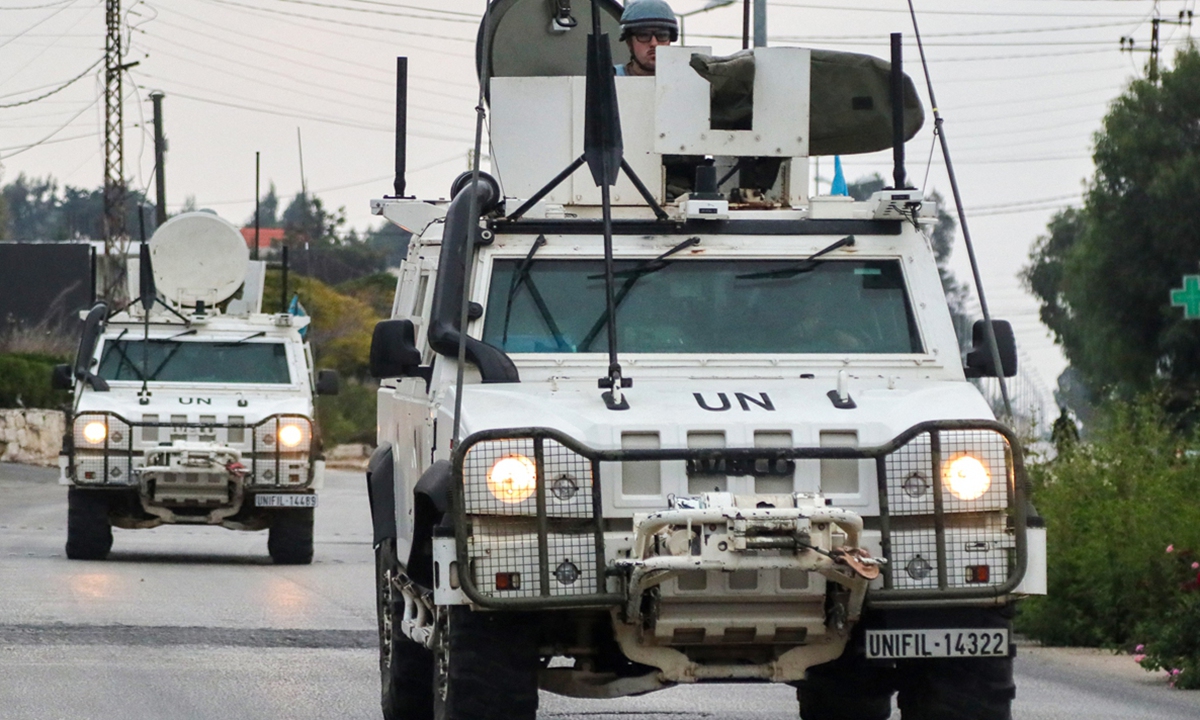
Vehicles of UNIFIL patrol in Marjeyoun in southern Lebanon on October 11, 2024, amid the ongoing conflict between Hezbollah and Israel. Photo: AFP
Chinese peacekeeping units in Lebanon are safe now. China is closely monitoring the security situation in Lebanon, and will take additional measures to strengthen the security protection of our troops, a spokesperson for China's Ministry of National Defense said on Tuesday.
China is seriously concerned and strongly condemns the Israeli military's attack on United Nations Interim Force in Lebanon (UNIFIL). China firmly opposes any attack on UN peacekeepers. We require a thorough investigation on the incident and hold those responsible accountable. We urge relevant parties to take real actions to prevent such an incident from happening again. The parties involved in the conflict must ensure the safety of the personnel and assets of UNIFIL, said Wu Qian, spokesperson for China's Ministry of National Defense.
Criticism mounted on Monday over attacks on United Nations peacekeepers in southern Lebanon, as Israeli Prime Minister Benjamin Netanyahu repeated the warning for them to temporarily leave the area where the military is operating against Hezbollah militants, the Associated Press reported.
Since the start of Israeli ground operations in Lebanon on October 1, UNIFIL positions have been affected 20 times, including by direct fire and an incident on Sunday when two Israeli tanks burst through the gates of a UNIFIL base, media quoted the UN as saying.
"Five peacekeepers have been injured during these incidents, including one peacekeeper who sustained a bullet wound," UN spokesperson Stephane Dujarric told reporters on Monday. "The source of that gunfire has yet to be confirmed by UNIFIL."
Chinese Foreign Minister Wang Yi, also a member of the Political Bureau of the Communist Party of China Central Committee, held phone calls with the foreign ministers of both Iran and Israel on Monday.
China is highly concerned about the tension between Israel and Iran and believes that renewed conflict and turmoil in the region serves the interests of no one, Wang said to Israeli Foreign Minister Israel Katz on Monday.
As a permanent member of the United Nations Security Council, China has always stood on the side of peace, international law and truth and will continue to play a constructive role in de-escalating the situation and restoring peace in the region, Wang said.
Wang stressed that UNIFIL is mandated by Security Council resolutions to carry out peacekeeping missions, adding that the Israeli side should take concrete measures to ensure the safety of UNIFIL personnel.
Speaking in a phone call with Iranian Foreign Minister Seyyed Abbas Araghchi on the same day, Wang said that that the negative impacts of the current Gaza conflict are clearly spilling over, and regional tensions are escalating continuously.
China has always advocated resolving hotspot issues through dialogue and consultation and opposes exacerbating tensions, expanding conflicts and taking military adventures, Wang said, calling on all parties to make more efforts to safeguard regional peace and stability.
Amid escalating tensions between Iran and Israel, there is a significant risk of spiraling conflicts in the Middle East. Foreign Minister Wang Yi's latest phone calls with the foreign ministers of both countries aim to de-escalate the situation and clarify China's position on the matter. Wang Jin, an associate professor at the Institute of Middle Eastern Studies at Northwest University in Xi'an, told the Global Times on Tuesday.
Israel has assured the US that a planned retaliatory attack on Iran will not target nuclear or oil facilities, the Washington Post reported on Monday.
Israel vowed to counterattack after Iran fired ballistic missiles at the country. On October 1, Iran launched approximately 180 missiles at strategic sites in Israel, claiming the strikes were retaliation for the assassinations of key figures, including Hamas leader Ismail Haniyeh, Hezbollah leader Hassan Nasrallah, and senior Iranian commander Abbas Nilforoushan.
The scale of Israel's counterattack against Iran will be crucial in determining whether the conflict escalates into a larger war. If Israel's response is limited and restrained, Iran is likely to retaliate in a measured manner. However, a large-scale attack by Israel could provoke a fierce response from Iran, further intensifying the current situation, according to Wang Jin.




